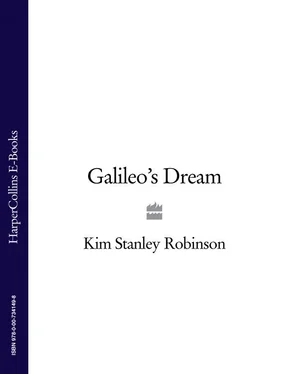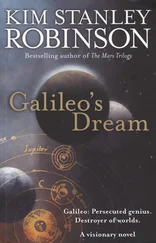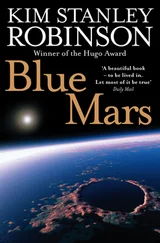‘Not good,’ Cartophilus said.
‘Maybe it’s Hera,’ the stranger said darkly.
Cartophilus shrugged again. Clearly this was the stranger’s problem.
They stood there in silence. It was a chill evening. Long minutes passed. Galileo bent down and looked through the lens again. Jupiter was still in the middle of it. He swallowed hard. This was stranger than dreaming. ‘This is not just a telescopio,’ he said, almost remembering now. Blue people, angels…‘It’s something like a, a tele-avanzare. A teletrasporta.’
The stranger and Cartophilus looked at each other. Cartophilus said, ‘The amygdala can never be fully suppressed. And why shouldn’t he know?’
The stranger re-examined the boxy side of the device. Cartophilus sat down on the floor beside it, stoical.
‘Ah. Try it again,’ the stranger said, a new tone in his voice. ‘Take another look.’
Galileo looked. Moon I was just separating from Jupiter on its west side. III and IV were out to the east. An hour must have passed since the two visitors had arrived.
Moon I cleared Jupiter, gleamed bright and steady in the black. Sometimes it seemed the brightest of the four. They fluctuated in that regard. I seemed to have a yellow tinge. It shimmered in the glass, and in the same moment Galileo saw that it was getting bigger and more distinct, and was mottled yellow, orange, and black-or so it seemed-because in that very same moment he saw that he was floating down onto it, dropping like a landing goose, at such the same angle as a goose that he extended his arms and lifted his feet forward to slow himself down.
The spheroid curve of Moon I soon revealed itself to be an awful landscape, very different to his vague memories of Moon II, which were of an icy purity: I was a waste of mounded yellow slag, all shot with craters and volcanoes. A world covered by Etnas. As he descended, the yellow differentiated into a hell’s carnival of burnt sulphur tones, of umbers and siennas and burnt siennas, of topaz and tan and bronze and sunflower and brick and tar, also the blacks of charcoal and jet, also terracotta and blood red, and a sunset array of oranges, citron yellows, gilt, pewter-all piled on all, one colour pouring over the others and being covered itself in a great unholy slag heap. Dante would have approved it as the very image of his burning circles of Hell.
The overlayering of so many colours made it impossible to gauge the terrain. What he had thought was a giant crater popped up and reversed itself, revealed as the top of a viscous pile bigger than Etna, bigger than Sicily itself.
He floated down toward the peak of this broad mountain. On the rim of the crater in its summit was a flat spot, mostly occupied by a round yellow-columned temple, open to space in the Delphic style.
He drifted down onto the yellow floor of this temple, landing easily. A square box made of something like lead or pewter lay on the ground beside him. His body weighed very little, as if he were standing in water. Overhead Jupiter bulked hugely in the starry black, every band and convolute swirl palpable to the eye. At the sight of it Galileo quivered like a horse in shock and fear.
On the other side of the box stood a knot of some dozen people, all staring at him. The stranger was now standing behind him.
‘What’s this!’ the stranger exclaimed angrily.
‘You know what this is, Ganymede,’ said a woman who emerged from the knot of people. Her voice, low and threatening, came to Galileo in language that was like a rustic old-fashioned Tuscan. She approached with a regal stride, and Galileo bowed without thinking to. She nodded his way, and said, ‘Welcome to Io, you are our guest here. We have met before, although you may not remember it very well. My name is Hera. One moment please, while I deal with your travelling companion.’
She stopped before the stranger, Ganymede, and looked at him as if measuring how far he would fall when she knocked him down. She was taller than Galileo and looked immensely strong, in form like one of Michelangelo’s men, her wide shoulders and muscular arms bursting from a pale yellow sleeveless blouse, made of something like silk. Pantaloons of the same material covered broad hips, thick long legs. She seemed both aged and young, female and male, in a mix that confused Galileo. Her gaze, as she looked from the stranger to Galileo and back again, was imperious, and he thought of the goddess Hera as described by Homer or Virgil.
‘You stole our entangler,’ Ganymede accused her, his voice coming to Galileo’s ears in an odd Latin. The Jovians’ mouths moved in ways that did not quite match what Galileo heard, and he supposed he was the beneficiary of invisible and very rapid translators. ‘What are you trying to do, start a war?’
Hera glared at him. ‘As if you haven’t already started it! You attacked the Europans in their own ocean. Now the council’s authority is shattered, the factions are at each other’s throats.’
‘That has nothing to do with me,’ said Ganymede coldly.
As Galileo listened to them denounce each other, little flashes of imagery brought to him the extraordinary idea of a voyage down into the subglacial ocean of Europa. He wondered what had happened, and what the situation here was. Ganymede’s indignation sounded suspiciously defensive to Galileo, and was causing the man to thrust his narrow jaw out to the side, making his face look like a bent plough blade. ‘This is no joke! This is Galileo you’re kidnapping!’
‘You’re the one who kidnapped him,’ Hera replied. ‘I am rescuing him from you. Really your fixation on this particular analepsis is getting to be too much. Galileo of all people is no one to trifle with, and yet you use him just to scare the council with your rashness.’
Ganymede put his hands to his jaw and straightened it with a visible effort, his face flushed a dark red. ‘We’ll talk about this later.’
‘No doubt. But for now I want you to leave us alone. I am going to explain some things to our visitor here.’
‘No!’
At this the people standing behind Hera moved forward en masse. They wore clothes similar to hers, and were similarly big and brawny, and moved in a way that reminded Galileo of Cosimo’s armed retainers, the Swiss guards in particular, when they were muscling in to keep the peace or remove someone no longer in Cosimo’s favour.
Hera nodded at them, and said to Ganymede, ‘Stay here with my friends. You know Bia and Nike, if I am not mistaken.’
‘I can’t allow this!’
‘It’s not a question of what you allow or don’t. You have no authority on Io. This is our world.’
‘This is nobody’s world! It’s a world of exiles and renegades, as you well know, being chief among them. My own group has taken refuge here.’
Hera said, ‘We let people live here who will, but we’ve been here the longest, and we decide what happens here.’ She went to Galileo’s side, and her friends moved as a group to stand between the two of them and the stranger.
Hera said to Galileo. ‘Welcome to Io. I was with you when they made their dive into the ocean of Europa. Do you remember that?’
‘Not quite,’ Galileo said uncertainly. Blue depths; a sound like a cry…
With a disgusted glance at Ganymede, she said, ‘Ganymede’s use of amnestics is crude, very much of a piece with the rest of his actions. I can perhaps return some of your memories to you later. But first I think it may be best to explain the situation to you a bit. Ganymede has not told you the full story. And some of what he’s told you is not true.’
She picked up the pewter box from the ground, and held it in her arms as she led him away from the expostulating Ganymede and the group surrounding him. Despite Ganymede’s objections, Galileo followed her. Galileo was interested to hear what she might say; and he already knew that she was going to get what she wanted no matter what. He had seen wilful women before.
Читать дальше












